In this webinar and Q&A, solicitor and former regulator David Gardner provides exclusive insights...

Develop the most advanced clinical skillset and critical awareness of dermatology principles and treatment options.
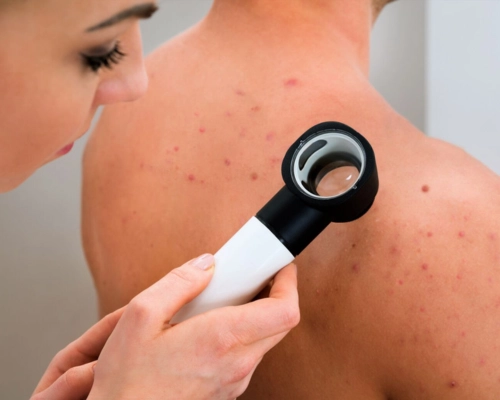
Round out your dermatological knowledge to accurately screen patients with difficult and complex issues of the skin and hair in primary care.
- This course is perfect for advanced practitioners with prior training or experience.
- Learn how to manage various dermatological conditions from richly illustrated clinical examples and interactive case discussions.
- This course is for medical doctors, International Medical Graduates, registered nurses, dermal therapists, pharmacists, and degree-qualified health professionals.
- CPD-accredited and university-assured.
- Accurately diagnose and treat complex skin conditions.
- Learn to manage bites from spiders, snakes, and insects.
- Understand how to treat skin ulcers and pressure sores.
- Support patients with pregnancy-related and nutritional dermatoses.
- Identify and manage oral mucosal diseases, urticaria, and drug eruptions.
- Diagnose and treat vulvar skin diseases, STIs, and HIV.
- Build upon your dermatological knowledge to accurately screen all patients with skin concerns in primary care.
- Develop the most advanced clinical skillset and critical awareness of dermatology principles and treatments, with a greater focus on difficult and complex cases.
Submission and analysis of medical practitioners’ own cases are a key feature of this course and exceeds the outcome measurement CPD requirements.
Get unlimited access to all course content, additional learning materials, ongoing post-course support, and more.
The module focuses on how to detect, assess and plan treatment for insect, spider and snake bites. Venomous and non-venomous bites and stings are discussed including defining the difference between a bite and a sting. Insect bite and sting reactions including managing bite allergies are detailed. Diseases transmitted by insect bites are outlined including treatment options. Clinical and dermoscopic images are used throughout the module. Identifying and managing snake bites including first aid measures are discussed.
This module focuses on skin ulcers, pressure sores and wound care. The module introduces a guide to identifying skin ulcers, pressure sores and wound care including treatment for a range of pressure ulcers. The definition, symptoms and stages of pressure injuries are outlined including the wound healing process. The second section involves eight clinical cases and looks at how to identify the wounds, the wound healing stages and how to clinically manage each of these cases including screening for risk factors and underlying causes such as diabetes. Considerations include choice of dressings, bandages, equipment and the healing process. Non-healing ulcers are also discussed. Prevention strategies for patients at high risk of developing pressure ulcers are outlined. The final section focusses on wound care including debridement, cleansing, dressings and topical agents. Best practice recommendations are featured.
This general dermatology module focuses on diagnosing complex pregnancy dermatoses and the implementation of appropriate investigations and management strategies. The physiologic changes during pregnancy are detailed including hyperpigmentation, hair and nail, glands, connective tissue and vascular changes. The clinical and histopathological features of pemphigoid gestationis, polymorphic eruption of pregnancy, intrahepatic cholestasis of pregnancy and atopic eruption of pregnancy are discussed together with differential diagnosis and management. The module concludes with identifying and managing autoimmune progesterone dermatitis and neonatal lupus.
This module focuses on oral mucosal diseases and how to recognise various conditions of the tongue, oral mucosa and lips. The first section focuses on tongue conditions including clinical features of the geographic, fissured and black hairy tongue. It discusses the management of aphthous ulcers, the manifestations of oral lichen planus and pemphigus vulgaris and other conditions including oral leukoplakia, cancer and Kaposi’s sarcoma. The features, symptoms and treatment for these conditions are outlined. Differential diagnosis and prevention strategies for a number of these conditions are included. Lip conditions in this module include mucocele, fibromas, pyogenic granulomas and SCC. Clinical images are used throughout the module.
This module focuses on identifying, diagnosing and treating four different types of drug eruptions then moves to chronic urticaria and distinguishing between erythema multiforme, Steven-Johnson syndrome and toxic epidermal necrolysis. Allergic conditions and less common reactions are included. The causes, differential diagnosis and management of chronic urticaria are discussed in detail. Contributors to triggering these conditions are outlined as well as treatment options. Clinical cases provide visual learning.
This module focuses on nutritional dermatoses and delusions of parasitosis. Content includes malnutrition, vitamin and mineral deficiencies, obesity dermatoses and delusions of parasitosis. The classifications and causes of malnutrition are explained in detail, including demographics, symptoms, testing, management and prognosis. The vitamin and mineral deficiency section explains how key vitamins and minerals work, their sources, and features/symptoms of deficiency. Differential diagnoses and treatment options are included. Obesity dermatoses is addressed and includes symptoms for leg ulcers, lipodermatosclerosis and lymphedema. The module concludes with the psychiatric disorder of delusions of parasitosis. Clinical patient presentations demonstrating this condition are shown and the management of this condition is suggested.
This module focuses on sexually transmitted infections (STIs) and HIV. The module demonstrates how to identify cutaneous manifestations of STIs including HIV and how to diagnose and treat related skin conditions using pattern recognition, history and laboratory exams. STIs covered include HPV, HSV, syphilis, condyloma, genital herpes, chancroid, and gonorrhea. Clinical cases are provided extensively throughout the module. Clinical features, testing and treatment options are outlined. HIV related skin conditions include seborrheic dermatitis, malassezia, crusted scabies, lymphedema, HPV and SCC are addressed with treatment options and best practice recommendations. This module covers international and Australian treatment options.
This module focuses on skin conditions of the vulva and includes pigmented lesions and inflammatory skin diseases. The first section investigates benign pigmented lesions on mucosal areas and includes melanosis, seborrheic keratosis, angiokeratoma, naevi, melanoma and Paget’s disease. Inflammatory skin diseases including eczema, psoriasis, lichen planus and lichen sclerosus. Irritants, allergens, symptoms and treatment options are listed. The role of reflectance confocal microscopy to assist with diagnosis of difficult lesions is considered.
If you're not interested in pursuing a full certificate in this field but simply want to enhance your skills in specific topics covered in this course, you can access the content of this and other courses for a flat fee of $83 per month (paid annually) within HealthCert 365.

Professor of Dermatology and Cutaneous Surgery at the University of Texas, USA.
Founder and medical director of the University Health System Skin Clinic in San Antonio, USA
Professor Richard Usatine is the Professor of Dermatology and Cutaneous Surgery at the University of Texas. He is the author of nine books and over 120 papers, founder of the Interactive Dermatology Atlas on the web, and is the most recognised skin cancer presenter in the USA. Since 2000, he has been chosen yearly by his peers to be included in The Best Doctors in America. He is also the national chair of the yearly Skin Course put on by the American Academy of Family Physicians, and is the founder and medical director of the University Health System Skin Clinic in San Antonio.
Richard has been involved in Global Health through his work in Mexico, Guatemala, Panama, Haiti and Ethiopia. In 2000, Richard Usatine was recognised as the national recipient of the Humanism in Medicine Award, by the Association of American Medical Colleges.

Associate Professor Caterina Longo is a board-certified dermatologist specialising in the diagnosis and treatment of skin cancers. Although providing the best care possible for patients remains her primary goal, she also committed to education and clinical research. She is actively involved in clinical research and has published numerous papers on topics related to skin cancer with an emphasis on melanoma, atypical nevi, Spitz/Reed nevi and non-melanoma skin cancer.
Caterina’s research interests are focused on the use of imaging instruments such as dermoscopy and confocal laser microscopy to recognise skin cancer early in its development. She pioneered the use of ex vivo fluorescence confocal microscopy for micrographic Mohs surgery applied for basal cell carcinoma and other visceral tumours. Caterina frequently lectures on these topics both nationally and internationally.

Dermatologist
Dr Christopher Ross is an Adelaide-based Dermatologist who completed a Bachelor of Science in Biomedical Science with Honours at Adelaide University in 2004, before completing his Bachelor of Medicine, Bachelor of Surgery at Flinders University in 2008.
Dermatology training was conducted at Women’s and Children’s Hospital, Flinders Medical Centre and Royal Adelaide Hospital; he was awarded Fellowship of the Australasian College of Dermatologists (FACD) in 2016. Dr Ross has published multiple articles in the Australasian Journal of Dermatology and has written and presented several courses in General Dermatology with HealthCert for teaching purposes.
Dr Ross has a keen interest in rural dermatology, providing outreach services to Darwin and rural South Australia. He also holds the position of Visiting Medical Specialist at Flinders Medical Centre, providing care and teaching to Dermatology registrars. Dr Ross has an interest in all general dermatology including acne, eczema, psoriasis and hair loss.
Dr Ross become a founding member of DermoDirect, which is an online teledermatology service that provides a valuable expert service to rural areas of Australia. He also is a founder of Diagnode, the telehealth platform behind Dermodirect.


Study at your own pace and to your own schedule. Interactivity, discussion, and feedback opportunities are included.

Easily meet your CPD requirements and gain valuable skills – all in one place for $83 per month.
$2095
.
Bundle two courses and save 5%, or three courses and save 10% upon enrolment.
Talk to us about deferred payment options, registrar scholarships and special rates.
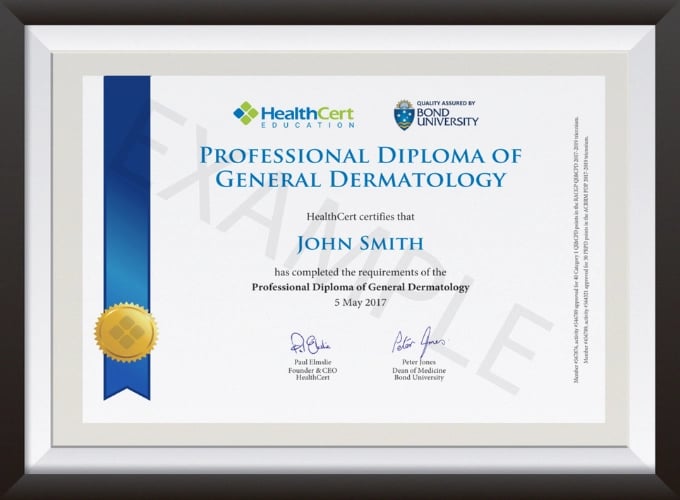

A fantastic dermatology course. I did my DPD in Wales over 10 years ago and was dubious as to whether it was worthwhile doing it. I also work primarily in skin cancer medicine rather than general practice and felt I would be going over "old ground". I was so mistaken! The content and lecturers were fantastic and I highly recommend the course to any primary care GP or skin cancer doctor.
Dr D. King
All the presenters are approachable and highly knowledgeable about the field, and they convey important points applicable in general practice.
Dr C. Marquez
Good, interactive course with excellent speakers. I particularly enjoyed the case study scenarios which helped to integrate the knowledge I've gained.
Dr A. Tucker
The General Dermatology course is invaluable and very relevant to general practice.
Dr T. Aung
This is a really good course and I learned a lot. I knew nothing in dermatology, and now I know what to do, when and how.
Dr F. Almotawa
| RACGP Activity Number | ACRRM Activity Number | Activity Title | Education Hours | Performance Hours | Outcome Hours | ||
|---|---|---|---|---|---|---|---|
| 408268 | 28549 | Pregnancy Dermatoses | 408268 | 28549 | 3.5 | 6 | 0 |
| 408276 | 28552 | utritional dermatoses and Delusions of parasitosis | 408276 | 28552 | 4 | 6 | 0 |
| 408281 | 28553 | Vulvar skin diseases | 408281 | 28553 | 3.5 | 6 | 0 |
| 408259 | 28547 | Bites: Animals, snakes and insects | 408259 | 28547 | 4 | 6 | 0 |
| 408273 | 28551 | Urticaria and Drug eruptions | 408273 | 28551 | 4.5 | 6 | 0 |
| 408263 | 28548 | Skin ulcers, pressure sores and wound care | 408263 | 28548 | 4 | 6 | 0 |
| 408270 | 28550 | Oral mucosal diseases | 408270 | 28550 | 4 | 6 | 0 |
| 410626 | 30994 | Sexually transmitted infections and HIV | 410626 | 30994 | 4.5 | 6 | 0 |
| 644849 | 32348 | Clinical Audit of General Dermatology: Psoriasis | 644849 | 32348 | 0 | 2 | 19.5 |
| 646472 | 32335 | Clinical Audit of General Dermatology: Acne | 646472 | 32335 | 0 | 2 | 19.5 |
| Total hours | 32 | 52 | 39 | ||||
View the CPD Hours for all HealthCert Education activities.
The Professional Diploma of General Dermatology is tailored for general practitioner training and suitable for medical doctors, degree-qualified medical professionals, registered nurses, pharmacists, and dermal therapists.
Participants must have completed the Advanced Certificate of General Dermatology (or qualification deemed equivalent). HealthCert also highly recommends successful completion of at least 50 cases of general dermatology prior to
Participants do not have to pass an IELTS test but, as the courses are delivered in English, proficiency in listening, reading and writing English is assumed.
Participants will require access to a computer/laptop, an internet connection and a basic level of technology proficiency to access and navigate the online learning portal.
Professional Diploma courses are at the highest level at HealthCert. There are additional professional requirements and submission of patient cases (clinical audit). A literature review must also be completed on journal articles.
The HealthCert Professional Diploma of General Dermatology is a combination of course activities and clinical audit.
Professionally recognised qualifications and prior studies may be recognised for entry into this course if the learning outcomes match exactly. Please ask a HealthCert Education Advisor for an individual assessment of your prior qualifications and experience.
This certificate course meets the minimum 50 hours CPD annual requirement across all three mandatory CPD activity types.
Upon successful completion of the course requirements, course participants will receive the Professional Diploma of General Dermatology and CPD hours.
This certificate course:
To learn more about the delivery of certificates in Australia and overseas, please visit our FAQs.
Professional Diploma pathway
This course is the final stage of the professional diploma pathway. The full pathway is: Professional Certificate of General Dermatology, Advanced Certificate of General Dermatology, Professional Diploma of General Dermatology.
Postgraduate pathways
Graduates of the HealthCert Professional Diploma of General Dermatology may apply for a scholarship to an online Master degree from our partner in the UK. HealthCert recommends the MSc in Dermatology in Clinical Practice which is awarded by University of Buckingham. Please contact our UK partner directly regarding this scholarship: https://www.diploma-msc.com/s/healthcert
Postgraduate Pathway with the University of Plymouth
This pathway is suitable for doctors who are mainly interested in clinical academic study. The Postgraduate Diploma in Dermatology is studied through the Rila Institute of Health Sciences and awarded by the University of Plymouth (UK).
There are three modules in the Postgraduate Diploma. Medical professionals who successfully complete the HealthCert Professional Certificate of General Dermatology, Advanced Certificate of General Dermatology and Professional Diploma of General Dermatology will be eligible to apply for Accreditation of Prior Certified Learning (APCL) for module 3 of the Rila Institute / Plymouth University Postgraduate Diploma in Dermatology.
The Postgraduate Diploma is mainly delivered online. No practical workshops will be required due to the APCL from the HealthCert qualifications. Overall there will be a time saving of 40 per cent of the postgraduate program due to the APCL. Exams will be held in Perth, Western Australia.
When the Postgraduate Diploma has been successfully completed, medical professionals can apply for credit from the Postgraduate Diploma to the Master of Science in the specialism awarded by the University of Plymouth.
Certified Clinical Attachments Pathway
Upon completion of the Professional Certificate of General Dermatology, participants can complete a Dermatology Clinical Attachment to increase the safety and accuracy of their work. Clinical Attachments in Dermatology are currently available at the University of Vienna under the supervision of Professor Harald Kittler.
Course graduates may also join the International Society of Dermatology (ISD).
This organisation is an RACGP-accredited CPD provider under the RACGP CPD Program.
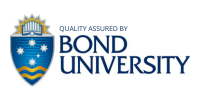

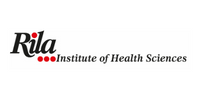
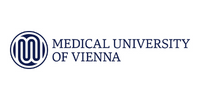

Don't see your question? Explore other faqs or talk to us.
Fees will vary based on the program and study option selected (fully online vs online + optional practical workshop). Payments can be made upfront or in monthly instalments. Special rates and various payment options are available. GP registrars and doctors in training enjoy a scholarship of up to $500. Talk to us to learn more.
Completion of any HealthCert course or attendance at an event will enable you to access the HealthCert Alumni Program which includes:
HealthCert Education is pleased to issue digital credentials for alumni. Digital credentials are a permanent online record of your successful completion of a HealthCert course and are issued to all course participants in addition to PDF certificates. If you are based in Australia, you also have the option to order a hard copy of your digital certificate for a small additional fee.
The recommended study duration of this certificate course is 101.5 hours, which includes study of the pre-course activities and readings, online lectures, live tutorials, and online assessment. This self-paced course offers the flexibility of 100% online study in your own time, at your own pace, in your own home or office, with no mandatory face-to-face requirements. You are not required to be online at specific times but can view and replay video lectures at your convenience.
All HealthCert courses meet World Federation of Medical Education standards. This certificate course qualifies for CPD hours from the Royal Australian College of General Practitioners (RACGP) and the Australian College of Rural and Remote Medicine (ACRRM) in Australia. It is recognised by the Royal New Zealand College of General Practitioners (RNZCGP) in New Zealand. It is recognised by the Hong Kong College of Family Physicians (HKCFP) in China. It is a self-submitted activity in Dubai and the United Kingdom. It is a self-submitted activity through the College of Family Physicians in Canada. If you live or work outside one of the above-mentioned countries, please contact us on admin@healthcert.com to discuss whether this course can be recognised in your country.

In this webinar and Q&A, solicitor and former regulator David Gardner provides exclusive insights...
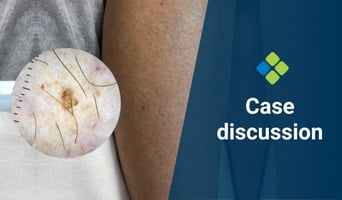
This week's case discussion, submitted by Dr Heather Lawson, features a 64-year-old female patient...

Mood changes in the postpartum period are extremely common, ranging from mild and transient “baby...
Want to stay up-to-date with the latest case studies, podcasts, free video tutorials and medical research articles pertinent to primary care?
Our Education Advisors can assist you with any queries and tailor our education pathway to suit your current expertise, interests and career goals.